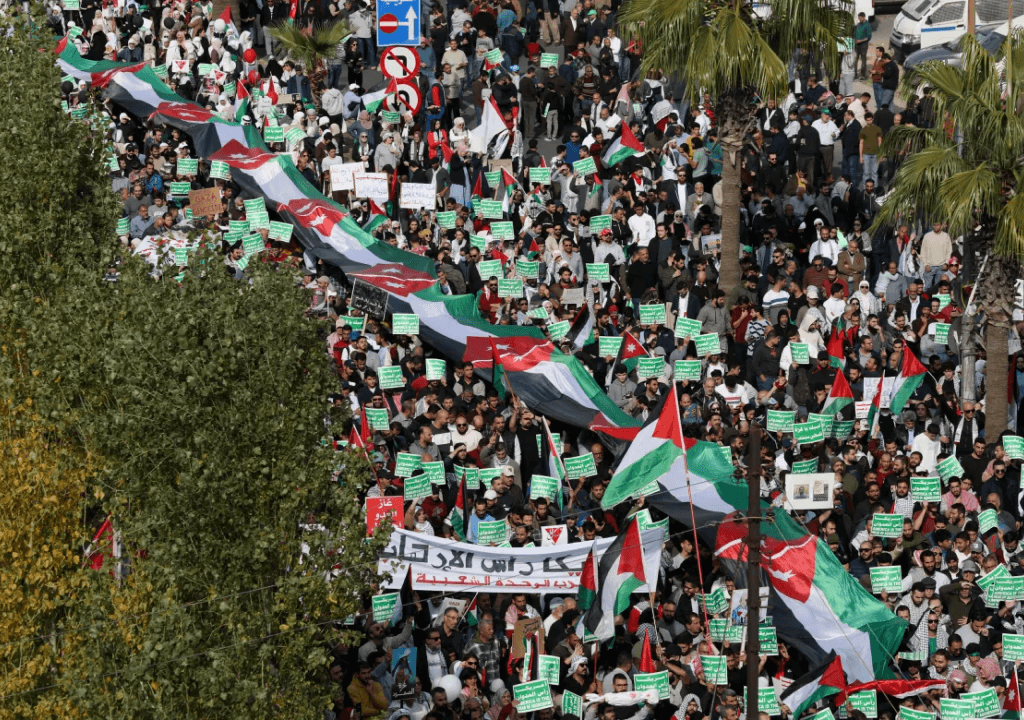As civilians in Gaza receive warnings and reports emerge of Israel preparing for more offensives, the reactions from Arab countries that have historically fought with Israel, such as Lebanon, Jordan, Syria, and Egypt, are interesting to watch. Jordan, the country with the longest border with Israel, and Egypt, now in a treaty with Israel, have no interest in further conflict and have become good neighbors, like Saudi Arabia. Lebanon and Syria are expected to be drawn into war soon due to the increased presence of Islamic terrorist organizations sympathetic to Gaza and their domestic collapses. Since the October 7 Hamas attack in Israel and the subsequent Israeli invasion of Gaza, few regional states have faced challenges as acute as Jordan, with its substantial Palestinian-origin population and prominent roles within the Arab and Muslim world. Once fiercely fighting Israel for Muslim solidarity, Jordan now appears to have understood its limitations in war, despite ongoing protests amid tight government control. As regional war tensions escalate with the potential involvement of Lebanon and Syria, can Jordan remain a friend of Israel or stay neutral?
As casualties have mounted in Gaza, outrage in Jordan, as elsewhere in the Muslim populated countries, has grown. Regular Friday protests, after the prayer, led by the kingdom’s Islamists, have brought participants close to the rare act of publicly criticizing King Abdullah, who has ruled Jordan since 1999. Though Jordan is relatively liberal compared to many other states in the region, reports noted that the “Regime’s red lines” on what can be published without repercussions have tightened “Dramatically” since the war began. In the first month of the conflict, at least 1,000 protesters were detained in the capital city, Amman, particularly at demonstrations near the Israeli embassy, which some tried to storm. People are angry not only at Israel’s actions in Gaza and Jordan’s inaction but also at the perception that Jordan is aiding Israel and the United States for economic gains, betraying Islam and Palestine. Jordan, with US assistance, shot down many of the more than 300 Iranian missiles and drones launched at targets in Israel as they flew over the kingdom. Officials stated that Jordan was defending its sovereignty and keeping its population of 12 million safe, but it is evident this was in the interest of the United States. Though lauded by Western powers, the kingdom’s actions have led to accusations at home that it was protecting Israel.
The King and the Jordanian government are amidst numerous pressures from different directions. The kingdom now navigates a “Tricky balancing act” as King Abdullah II and his advisers skillfully juggle the demands of citizens calling for tough action and punishment in the Gaza war, alongside the kingdom’s close ties to Washington and a 30-year-old peace treaty with Israel. King Abdullah has made statements and repeatedly called for international action to halt the conflict in Gaza, accusing Israel of war crimes, while Queen Rania has criticized the West’s “Complicity”. The kingdom’s diplomats have proposed multiple plans for governing Gaza, and its military has opened field hospitals in the territory and airdropped aid. In Amman’s corridors of power, debates are ongoing over whether the relationship with the US, which has thousands of troops in Jordan and provides $1.5 billion in economic aid annually, should be downgraded or reinforced. However, it is clear that Jordan is not capable of exerting enough pressure on the US to influence Israel, given its economic reliance on these countries. Interestingly, unlike in previous times, the absence of a unifying leader in the Arab world means Jordan must navigate these challenges alone. Therefore, it remains to be seen if the government is merely making statements to appease the dissatisfied populace.
Jordan consistently followed an anti-Zionist policy between 1948 and 1994 and both countries clashed on several occasions before 1994. In 1994, Jordan and Israel signed a peace treaty that normalized relations and resolved territorial disputes, including water sharing. The treaty resolved land and water issues and encouraged extensive cooperation in tourism and trade. Following the agreement, Israel and Jordan opened their borders, establishing several crossings that facilitated travel for tourists, businessmen, and workers between the two countries.
However, there have been several disputes between the two governments even after the treaty, and the public has not fully trusted each other. Now, Jordan faces a dilemma: If the war escalates to a regional level or if Israel’s actions in Gaza intensify, it is certain that the people will not obey the government, or the government will be forced to act. However, they know well that they are not capable of fighting without Arab unity as before, which makes them realize they cannot engage in conflict. A fight would have devastating effects on the country, which lacks the resources like other Arab nations. Definitely, tough times lie ahead for Jordan.








